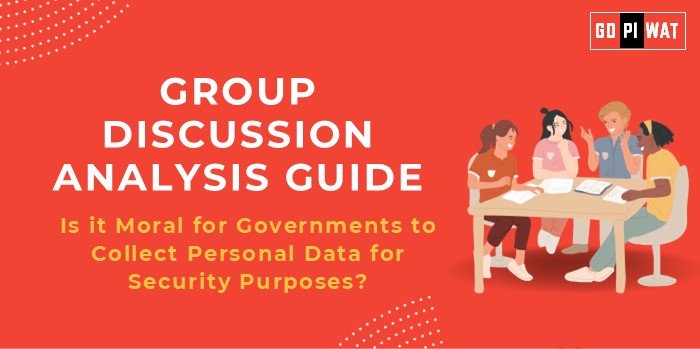📋 Group Discussion (GD) Analysis Guide
🔍 Is it Moral for Governments to Collect Personal Data for Security Purposes?
🌐 Introduction to the Topic
Governments worldwide face the dual challenge of ensuring security while respecting citizens’ privacy. With increasing cyber threats and terrorism, data collection has become pivotal, raising ethical dilemmas about balancing safety and individual rights.
The debate centers around the moral implications of governments collecting personal data, often justified by national security. The practice has gained attention after global surveillance disclosures, like the Edward Snowden revelations, and concerns over misuse of data by authoritarian regimes.
📊 Quick Facts and Key Statistics
- Global Data Usage: Over 120 countries have laws regulating data protection (UNCTAD 2023), yet practices vary widely.
- Surveillance Expansion: 72% of democratic countries expanded surveillance post-9/11.
- Cybersecurity Threats: $8 trillion in losses due to cybercrime globally in 2023 (Cybersecurity Ventures).
- Public Opinion: 60% of global citizens are concerned about government misuse of personal data (Pew Research 2023).
👥 Stakeholders and Their Roles
- Governments: Enforce data collection for security while upholding legal frameworks.
- Citizens: Expect protection without undue invasion of privacy.
- Private Sector: Provide infrastructure for data handling, often storing vast amounts of personal information.
- Civil Rights Organizations: Advocate for transparency and accountability.
- International Bodies: Establish global norms, e.g., GDPR in Europe.
🎯 Achievements and Challenges
✅ Achievements:
- Enhanced Security: Data tracking has prevented terrorist plots in multiple nations.
- Improved Emergency Response: Real-time data aided relief during global disasters like COVID-19.
- Smart Governance: Enabled smart cities with better resource management.
⚠️ Challenges:
- Privacy Breach Cases: Mass data leaks, e.g., Cambridge Analytica.
- Authoritarian Overreach: Misuse of surveillance in China and Russia.
- Global Comparisons:
- Successful Example: Estonia – transparent e-governance with robust data protection.
- Problematic Example: China – pervasive surveillance with minimal citizen oversight.
📂 Structured Arguments for Discussion
- Supporting Stance: “Data collection is a necessary tool to counter modern security threats and protect citizens.”
- Opposing Stance: “Unchecked data collection violates fundamental human rights and risks misuse by authorities.”
- Balanced Perspective: “While data collection enhances security, strict regulatory frameworks are essential to protect individual freedoms.”
🚀 Effective Discussion Approaches
- Opening Approaches:
- Start with a case study: “Post-9/11, U.S. data collection reportedly thwarted 50 terror plots.”
- Use statistics: “With $8 trillion lost to cybercrime, data collection seems indispensable for security.”
- Counter-Argument Handling:
- Acknowledge privacy concerns: “Public mistrust grows with each reported misuse.”
- Present solutions: “Transparent oversight and limited retention of data can balance security and privacy.”
🔍 Strategic Analysis of Strengths and Weaknesses
- Strengths:
- Enhances public safety.
- Facilitates disaster management.
- Weaknesses:
- Risk of overreach and misuse.
- Lack of global standardization.
- Opportunities:
- Develop ethical AI for surveillance.
- Strengthen international frameworks like GDPR.
- Threats:
- Loss of public trust.
- Escalation of cyberattacks targeting databases.
📚 Connecting with B-School Applications
- Real-World Applications: Ethical dilemmas in data handling can inspire projects in cybersecurity, legal compliance, and governance.
- Sample Interview Questions:
- “How can businesses ensure ethical data usage while supporting government policies?”
- “Evaluate the role of technology in balancing privacy and security.”
- Insights for Students:
- Understand regulatory environments.
- Analyze the balance between ethics and efficiency in decision-making.


